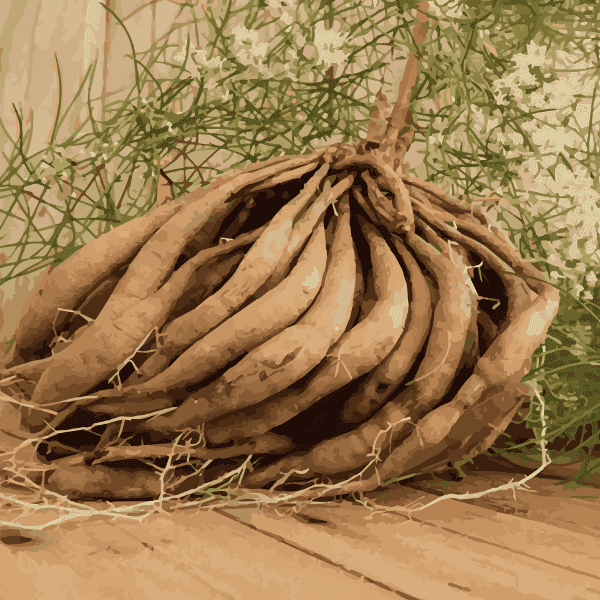
Shatavari Root {Organic}
Shatavari, scientifically known as Asparagus racemosus, is a versatile herb in Ayurvedic medicine revered for its rejuvenating and nourishing properties. It is primarily used to support female reproductive health, balance hormones, and enhance fertility. Shatavari is also valued for its ability to promote digestive health, modulate immunity, and alleviate stress, making it a cherished herb in holistic wellness practices worldwide.
You might need Shatavari if . . .
Are you interested in supporting your mental health, hormonal health and reproductive health?
What about increasing your immune system and digestive health?
This herb may even help reduce inflammation and strengthen your respiratory health.
It is also a common herb for women for hormonal imbalances and even to increase lactation. Shatavari root is an adaptogenic herb. Often referred to as the “queen of herbs,” it is a species of asparagus plant that grows in India, Nepal, and Sri Lanka.
Benefits of Shatavari
- Female reproductive health: Shatavari is best known for its ability to support female reproductive health. It helps regulate menstrual cycles, alleviate PMS symptoms, and enhance fertility.
- Digestion: Shatavari promotes digestive wellness by serving as a natural antacid, helping treat issues such as gastritis, ulcers, and indigestion. Its anti-inflammatory properties soothe the digestive tract and enhance the absorption of nutrients, potentially offering relief for conditions like constipation. A 2006 study demonstrated Shatavari's effectiveness as an antiulcerogenic agent, inhibiting gastric acid release and protecting against gastric mucosal damage in rats with ulcers. Additionally, it may support the maintenance of a healthy gut microbiome.
- Stress and anxiety support: Shatavari, an adaptogen, supports effective stress management within the body by calming the nervous system, alleviating anxiety, and promoting a sense of well-being. Its ability to regulate cortisol, the stress hormone, helps improve mood, boost energy levels, and enhance overall resilience to stressors.
Common Ways to Use Shatavari
- Powder: Mix one to two teaspoons of shatavari powder with warm milk or water and consume once or twice daily.
- Capsules: You could buy capsules premade or make your own!
- Liquid extract: Extracts are a powerful and easy way to quickly get herbal medicine in your body.
Growing and Foraging Information
You can easily buy dried shatavari root online. But if you are interested in growing your own, Shatavari thrives in various environments, from the lush tropical jungles of Sri Lanka to the foothills of the Himalayas. It adapts well to both humid, jungle-like conditions and arid climates alike. It is a Perennial Evergreen Herb that can be harvested all year round! You can harvest after 12-14 months of maturity or after the seeds have been set. It likes heat so that it would be best kept in a greenhouse.
Safety Concerns
Shatavari has been used as an herbal remedy for centuries, but clinical evidence supporting its effectiveness as a treatment is still insufficient. While small amounts of the herb seem safe, caution is advised, especially in pregnancy or with higher doses. One study suggests the test compound could offer a safe alternative to modern drugs and supports Shatavari's traditional use. However, further clinical and pharmacological research with more extensive and more diverse samples and longer durations is needed to fully understand its effects, particularly in menopausal women.
Drug Interaction: If you are taking any prescription medications, it is important to always consult with the prescriber before adding any herbs to your diet.
Breastfeeding and Pregnancy: Asparagus racemosus is known in Ayurvedic literature for its ability to promote milk production, was tested in a study involving 60 lactating mothers. This research used a randomized, double-blind clinical trial to measure changes in prolactin hormone levels over time. Secondary parameters like mothers’ and babies’ weights, mothers’ satisfaction levels, and babies’ well-being were also assessed. The study found that oral administration of the herb led to more than a three-fold increase in prolactin levels compared to a control group. Secondary measures supported these primary results and were statistically significant.
Other Concerns: Shatavari is a safety class 1 (safe for proper consumption) and an interaction Class A (no clinically significant reactions anticipated). It is widely considered safe and does not typically cause any adverse effects.
Select Studies About Shatavari
This clinical trial was a double-blind, randomized, placebo-controlled, parallel-group study involving 60 subjects. It was carried out at the medical outdoor patients clinic department of the Institute of Postgraduate Ayurvedic Education and Research at the S. V. S. P. Hospital, Kolkata.
Exploring pharmacological properties and food applications of Asparagus racemosus (Shatavari)
“Shatavari, derived from Sanskrit meaning "who possesses a hundred husbands," is revered as a general tonic and a specific tonic for female reproductive health. Often referred to as the "Queen of herbs" in Ayurveda, it symbolizes love and devotion and is renowned for its fertility-boosting properti. Shatavari is a prominent herb in Ayurvedic medicine, particularly acclaimed for its efficacy in addressing various female reproductive issues.”